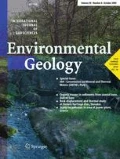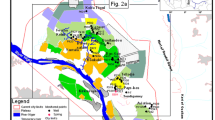Abstract
Groundwater quality in the city of Merida, Yucatan, Mexico, where dependence on groundwater supply is 100%, is affected by urbanization. Data from the sampling of shallow wells and boreholes along with water level records are used to study the aquifer. Chemical changes in time of the bottom and top half of the freshwater zone are the basis for hydrogeochemistry. The comparison of 1970 data (which represent information prior to urbanization) to 1991, suggests that the most affected (contaminated) areas coincide with that of urbanization.
Similar content being viewed by others
Author information
Authors and Affiliations
Additional information
Received: 1 October 1997 · Accepted: 23 February 1998
Rights and permissions
About this article
Cite this article
Graniel, C., Morris, L. & Carrillo-Rivera, J. Effects of urbanization on groundwater resources of Merida, Yucatan, Mexico. Environmental Geology 37, 303–312 (1999). https://doi.org/10.1007/s002540050388
Issue Date:
DOI: https://doi.org/10.1007/s002540050388




